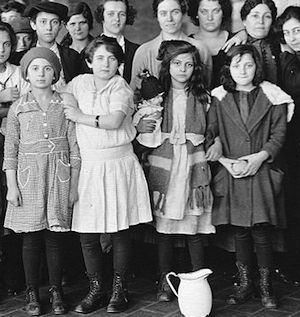
With millions of people around the world on the move, it's tempting to see the immigration problem in the U.S. as a matter of what to do about the undocumented 11 million.
In reality, our mistake is that, in general, we condescend to those who live as unskilled and low-skilled workers and admit too few of them on temporary work visas, with a chance to become citizens. Too few movers, gardeners, elder-care workers, dishwashers, tomato pickers, hotel housekeepers and new construction laborers. This refusal to legally process and admit more low-skilled and unskilled workers is a self-inflicted economic wound and moral disgrace.
The U.S. Bureau of Labor Statistics says that, in the decade ahead, the U.S. may need 3 million more unskilled workers to fill those jobs and others. With only 5,000 work-related visas available each year for low-skilled workers, the undocumented have entered anyway and often remained in the U.S.
It's middle-class blasphemy, calling for equal treatment of pushcart vendors and PhDs, but it's good policy. Scholar Michael Clemens, writing on the website of Foreign Policy magazine in 2013, said efforts at immigration reform that fail to address the need for more unskilled workers "will similarly herald a new wave of unauthorized immigration unless their low-skill work-visa caps are made much more flexible, starting from the essential labor needs of U.S. employers, and that's unlikely."
With such apparent disdain for less-skilled labor, what message do we send the world? Instead of bringing in this labor force through legal channels, we force employers and immigrants to work in an illegal black market.
So that you know my potential biases, my mother, the former Allegra Zacharia, entered the U.S. from Greece in 1948. She worked her way up the ladder of New York City's garment industry and sewed our family into the city's middle-class suburbs. How many other immigrants over the years have stitched dresses or mopped floors so their families, whether here or in another country, could sleep under a better roof or attend a better school?
'Selling' Immigration
That's exactly the type of worker-immigrant U.S. law now shuns. Key parts of our immigration law remain built around the notion that we should admit only those with the "human capital" of education and training. Mass-immigration critic Mark Krikorian would go further. He says the U.S. should grant temporary work visas mainly to "the real Einsteins."
To sell immigration to the U.S. public, Congress has put out, since 1952, a "help wanted" sign for immigrants with master's degrees, money or artistic distinction. As a result, we get software-savvy engineers from Bangalore and deep-pocketed parvenus from Beijing.
The U.S. reserves about 80,000 work visas each year for "persons of extraordinary ability" in the arts, sciences, education, business, athletics and academics. It favors those with ability in international business, advanced professional degrees or a couple of years of training for skilled work.
Another 40,000 visas are available to skilled workers with at least two years of training or some college. Ten thousand more visas are available to persons who will invest at least $500,000 in job-creating enterprises.
By stacking the deck to benefit those with education and money, our lawmakers conjure the image of guest workers and possible future U.S. citizens who are young, technologically astute and employer-friendly. Dirty jobs don't count for much.
What's worse, past serious attempts at national immigration reform included a "merit-based" point system that would have only deepened the injustice.
In other countries with similar systems that rely on immigrant workers, women also lose, having less education and fewer work credentials, according to the American Immigration Council. The middle-aged, elderly and anyone from a less-developed country are marginalized, too.
The best alternative is to reward work-related immigrants of all skill levels with visas and a chance for citizenship, meeting the gaping need for more low-skilled workers in the U.S. and ending the race, class and gender bias in immigration law.
Without the revisions, immigration law and any future overhaul will reflect our economic fear and ambivalence about manual labor, rather than meeting our workforce needs and our desire to be a just people.
Richard Korman is deputy editor of ENR and editor of the ENR RiskReview. He can be reached at kormanr@bnpmedia.com.




Post a comment to this article
Report Abusive Comment